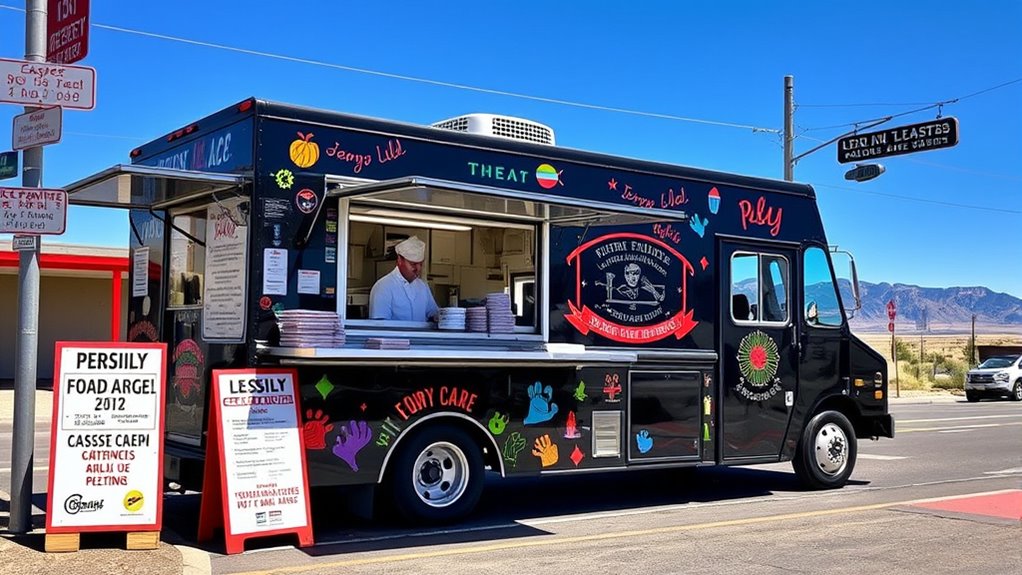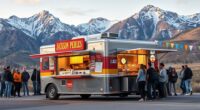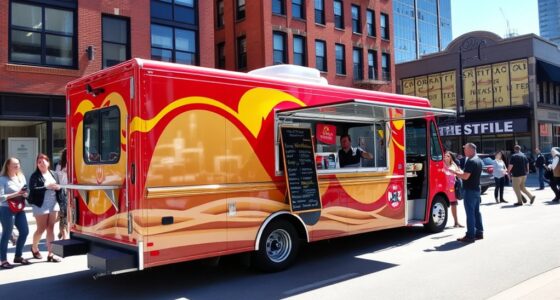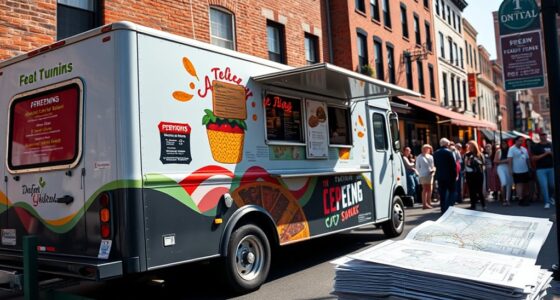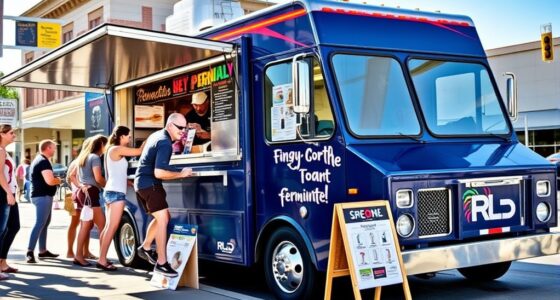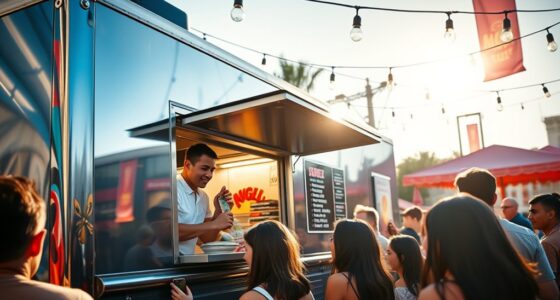To open a food truck in Casper, Wyoming, you’ll need to secure a city business license, register your business, and get any necessary mobile vending permits, especially for parks and public spaces. Budget around $1,864 for permits and licenses and expect annual insurance costs of $2,000–$6,000. Choose strategic locations like paved lots, and develop a menu with quick, fresh options. For successful marketing, leverage social media and community events—more tips to help you get started await you.
Key Takeaways
- Obtain necessary permits from Casper city and Wyoming state agencies, including business licenses, health permits, and parking permits.
- Budget $40,000–$100,000 for vehicle, equipment, permits, insurance, and initial inventory costs.
- Verify zoning and parking restrictions, focusing on approved paved lots and downtown permit limits (e.g., $25 per space).
- Develop a menu with 8-15 signature items, emphasizing quick prep, seasonal ingredients, and dietary options.
- Use social media, especially Facebook, for marketing, engaging local events, and implementing loyalty programs to increase visibility.
Navigating Permits and Licensing Requirements
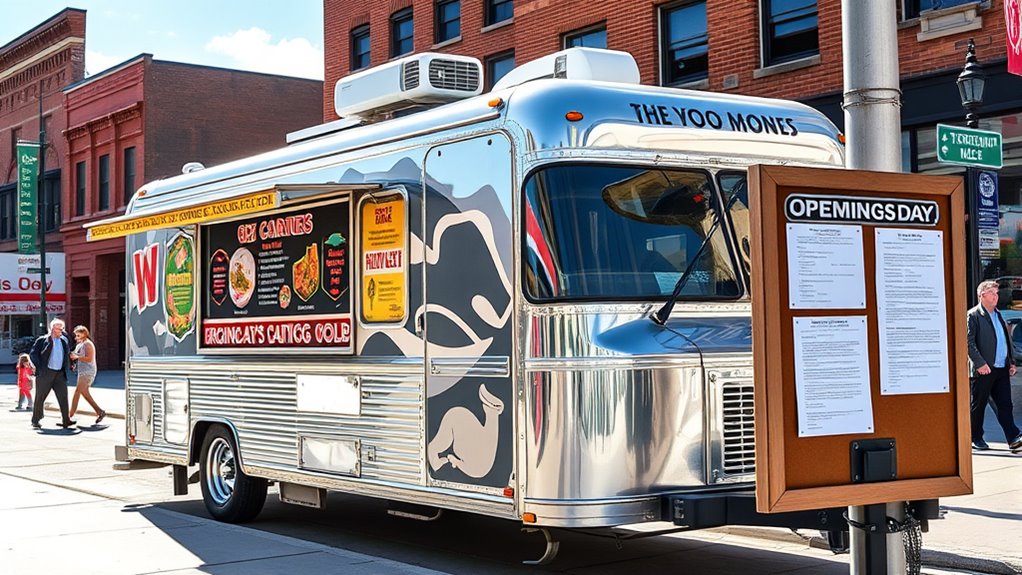
Getting your food truck up and running in Casper requires steering a series of permits and licensing steps. First, you need to obtain a City of Casper business license through the Citizen Self Service portal before you start operations. If you’re operating under a trade name, register your business name as a DBA or LLC with the Wyoming Secretary of State, as proof may be required for city permits. Verify municipal mobile vending or transient vendor license requirements with Casper offices; some areas, like Parks & Trails, need special permission for on-park vending and enforce parking and trash rules. Keep your contact info current in the city portal to receive permit updates. Additionally, check if any temporary fee waivers are in place, as Casper has previously waived mobile food vendor fees. Understanding market regulations can help ensure compliance and smooth operations for your food truck business.
Understanding Food Safety and Health Regulations
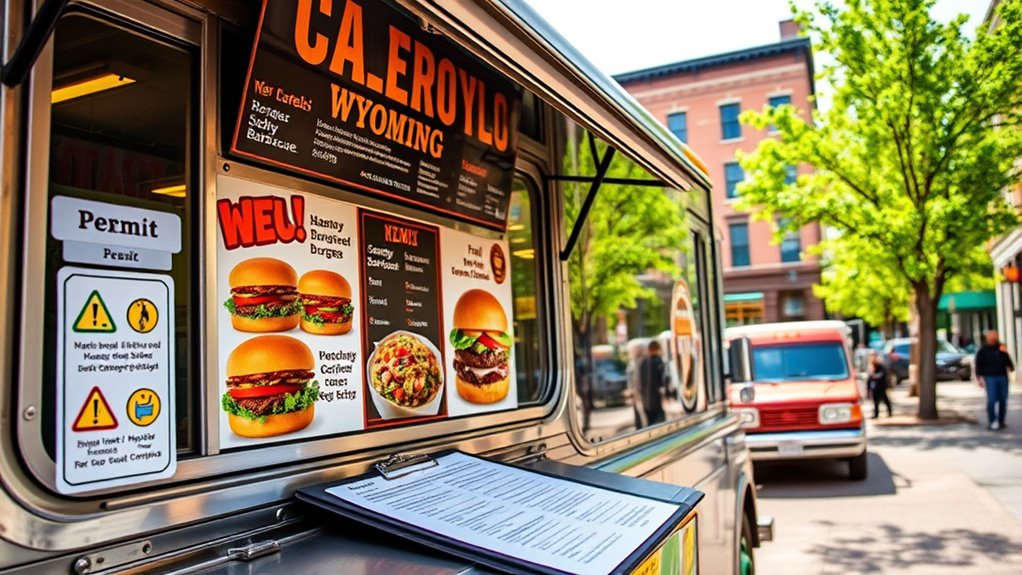
You need to guarantee your food sources meet safety standards to avoid contamination and violations. Proper temperature control is vital for keeping perishable foods safe and complying with health regulations. By maintaining accurate records and following HACCP guidelines, you can keep your food truck operations safe and legal. Implementing regular sanitation procedures is also essential to prevent foodborne illnesses and ensure compliance with health inspections. Additionally, understanding Glycolic Acid benefits can be beneficial if you plan to include skincare products or treatments in your offerings, ensuring safety and proper usage.
Food Source Compliance
Ensuring food source compliance is vital for food truck operators in Casper, Wyoming, to meet state and local health regulations. You must obtain a license from the Wyoming Department of Agriculture or your local health department for food processing, storage, or preparation. This license is valid statewide, so you don’t need multiple local licenses. Depending on your sales activities, you might also need a sales tax license. Fire safety compliance is mandatory, and you’ll need a fire inspection during licensing. Regular inspections, at least annually, focus on hygiene, cross-contamination prevention, sanitization, and pest control. You must also follow proper food storage practices, avoid cross-contamination, and keep detailed records of your food sources. Maintaining proper food storage procedures is essential to prevent spoilage and contamination. Operating within zoning regulations and permitted locations is essential to maintaining compliance and avoiding penalties. The statewide licensing process simplifies the administrative process for food truck operators across Wyoming, making it easier to stay compliant while expanding your business.
Proper Temperature Control
Maintaining proper temperature control is essential for food safety and compliance with Wyoming health regulations in Casper’s food trucks. You must keep potentially hazardous foods at 41°F (5°C) or below, or 135°F (57°C) or above during storage and service. Foods in the danger zone cannot be held for extended periods; rapid cooling or discarding is required if limits are exceeded. Use accurate metal-stem thermometers to verify temperatures and regularly check and record these during operations. For cooling, foods should be placed in shallow pans not exceeding 5 inches deep to promote quick cooling. Thawed foods must stay at or below 41°F, using refrigeration, running water, or controlled methods. Proper reheating to 165°F ensures safety before hot holding. These practices help prevent foodborne illnesses and meet Wyoming’s health standards. Regular temperature monitoring is critical, and all temperature data should be documented for compliance purposes. Implementing temperature control technology can enhance accuracy and efficiency in maintaining safe food temperatures.
Estimating Startup Costs and Ongoing Fees
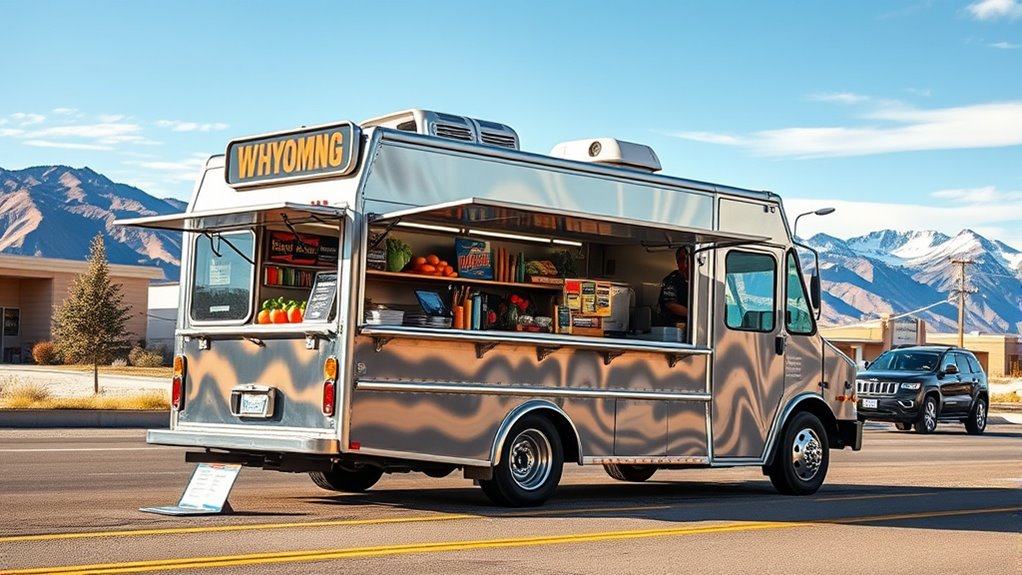
Understanding your startup costs and ongoing fees is essential to launching your food truck in Casper. You’ll need to budget for the vehicle, equipment, permits, and insurance, which can vary widely. By breaking down these expenses now, you’ll be better prepared to manage your budget and keep your business on track. Casper’s permit and license costs are typically more affordable compared to larger metropolitan areas, making it a financially attractive location for new food truck operators. Additionally, exploring virtual hackathons can provide innovative ideas for marketing and operational strategies that enhance your business success.
Initial Investment Breakdown
Starting a food truck business in Casper, Wyoming requires careful planning of initial costs and ongoing expenses. Your main investment includes vehicle and kitchen setup, permits, and legal costs. Typically, a fully outfitted truck costs between $40,000 and $250,000, with used trucks and basic retrofits falling near $40,000–$100,000. Kitchen equipment adds $10,000–$75,000. Permits and licenses generally cost around $1,864, covering mobile vendor, health, and fire permits. You should also budget for insurance—$2,000–$6,000 annually—and legal formation, which ranges from $300 to over $2,000. In conclusion, initial inventory and smallwares can run $2,000–$6,000, depending on your menu complexity. Additionally, understanding vetted equipment options can help ensure safety and efficiency in your truck setup. These upfront investments set the foundation for your Casper food truck.
Operational Expense Overview
Estimating your operational expenses in Casper involves accounting for both ongoing fees and compliance costs that keep your food truck legally and safely running. You’ll need an annual city mobile vendor license, which includes application and renewal fees, plus $25 per space per day for downtown parking permits. State-level food permits and inspections from Wyoming’s Department of Agriculture or local health authorities are also required annually. Fire inspections typically cost around $125 per truck. You may need to rent a commissary or commercial kitchen, adding monthly fees. Insurance costs vary, covering general liability, vehicle, and workers’ comp, depending on coverage levels. Utilities, fuel, vehicle maintenance, and waste disposal are ongoing expenses. Finally, payroll taxes and staff wages also contribute to your operational costs. Additionally, understanding Bollywood Legends can inspire creative branding and storytelling for your food truck marketing strategy.
Choosing Prime Locations and Zoning Compliance
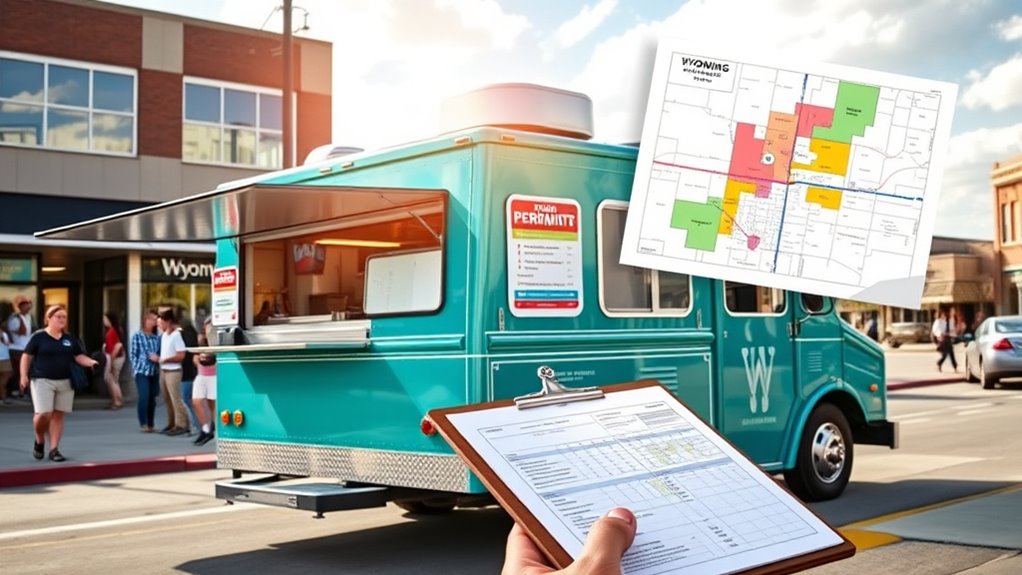
Choosing the right location is essential for your food truck’s success in Casper, Wyoming. To guarantee compliance and maximize visibility, you need to contemplate zoning rules carefully. First, verify permitted areas using the city’s zoning map, focusing on paved parking lots in commercial and industrial zones, and municipal parks during authorized events. Second, explore downtown Casper’s parking permits, which cost $25 per space daily, with limits on parking configurations and sponsorship requirements within 30 feet of local businesses. Third, ensure your chosen location adheres to restrictions like permit duration—such as a three-day limit in downtown—and parking space limits. Proper planning and zoning compliance help you avoid penalties and position your truck for maximum customer reach. Additionally, understanding existing relationship patterns can prevent misunderstandings with regulators and community members, ensuring smoother operations.
Crafting a Menu for Fast and Safe Service

Crafting a menu that enables fast and safe service is essential for your food truck’s success in Casper, Wyoming. Focus on a limited selection of 8-15 high-quality, signature dishes to prevent overwhelm and speed up orders. Avoid mixing cuisines that complicate prep, and choose items that can be cooked or assembled under five minutes. Streamlined menus improve operational efficiency and ensure consistency. Use fresh, seasonal ingredients to reduce costs and keep offerings fresh, rotating items regularly to maintain interest. Design your menu with clear categories, prominent best-sellers, and visible pricing. Include options for dietary preferences like vegetarian or gluten-free, and label allergens clearly. Prioritize prepped and simple dishes, and maintain strict hygiene to guarantee safety. Ensuring proper food safety practices is crucial to protect your customers and your reputation.
Effective Marketing Strategies to Grow Your Customer Base
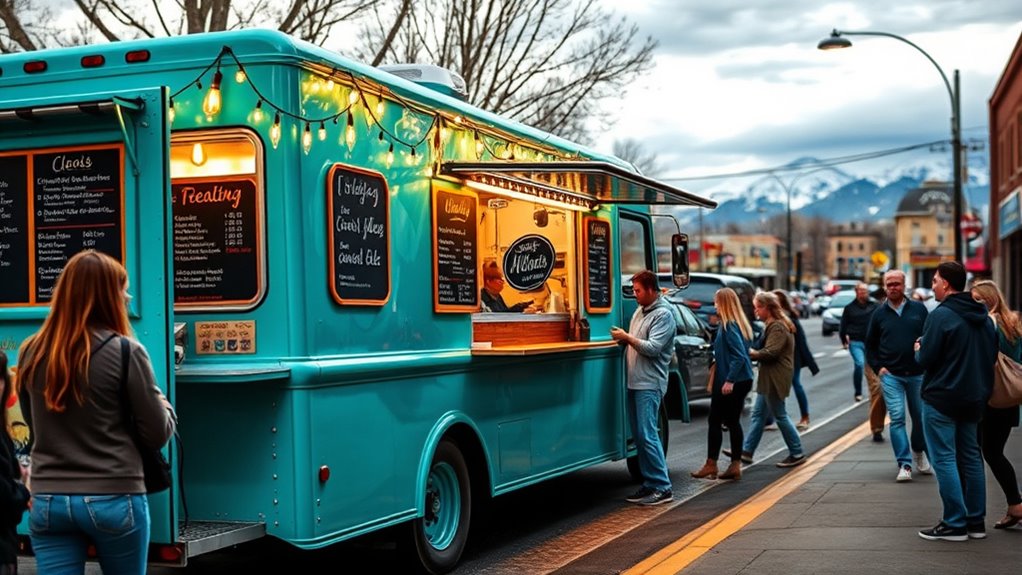
Leveraging social media platforms is one of the most effective ways to grow your food truck’s customer base in Casper, Wyoming. About 68% of food truck owners actively promote their business online, with Facebook being the top platform used by 75%. To maximize impact, focus on these strategies:
- Engage consistently with your followers through posts, updates, and behind-the-scenes content.
- Run targeted social media campaigns to boost visibility and attract new customers.
- Use mobile apps and location-based tools to make it easier for customers to find you, capitalizing on the 35% growth in app downloads.
- Incorporate loyalty programs and social sharing rewards into your digital marketing efforts, which can increase social media reach by up to 50% according to industry data.
Additionally, participating in local events and festivals, maintaining customer loyalty programs, and utilizing data-driven marketing can considerably enhance your reach and revenue.
Frequently Asked Questions
How Long Does the Permit Approval Process Typically Take in Casper?
You’re probably wondering how long the permit approval takes in Casper. Typically, if you submit your application at least two weeks before your event, you can expect processing in about 5 to 10 business days. Keep in mind, completing your paperwork accurately and scheduling inspections early can help expedite things up. Staying in contact with the health department and preparing all documents in advance ensures a smoother, faster approval process.
Are There Any Restrictions on Alcohol Sales From Food Trucks?
You might think serving alcohol from a food truck is straightforward, but Wyoming’s laws tell a different story. You’re restricted from selling alcoholic beverages unless you hold specific licenses, like a retail liquor license plus a catering permit, and you follow local rules. Plus, alcohol must be dispensed in approved areas, minors are barred, and excise taxes must be paid. Without proper permits, you risk penalties and legal trouble.
Can I Operate My Food Truck Year-Round in Casper’S Climate?
You can operate your food truck year-round in Casper’s climate, but you need to prepare for harsh winter conditions. Guarantee your vehicle has proper insulation, reliable heating, and engine block heaters. Protect water lines from freezing, and plan for increased fuel and maintenance costs. During winter, focus on indoor or sheltered locations, and adjust your menu and hours based on demand. Proper winterization is key to maintaining operations throughout the year.
What Are the Insurance Requirements for Food Truck Owners in Casper?
Insurance requirements for your food truck in Casper are like a safety net beneath a tightrope. You’ll need commercial auto liability with limits like $25,000/$50,000, general liability coverage, and workers’ comp if you have employees. Many event organizers require a Certificate of Insurance naming them as additional insured. Plus, consider inland marine coverage for equipment and food liability add-ons. These protect your business and help you meet local permits and event demands.
Are There Grants or Financial Assistance Programs Available for New Food Trucks?
You’re curious about grants or financial assistance for your new food truck. Luckily, Wyoming offers programs like the Startup Business Builder grants, providing up to $15,000 for expansion. Regional centers, SBDCs, and local economic offices also offer technical help and small grants. Federal programs, like USDA grants, may indirectly support your venture through partnerships. Check current deadlines and eligibility, and consider applying with help from local business resources.
Conclusion
Starting your food truck in Casper is a smart move, but don’t put all your eggs in one basket. Stay on top of permits, keep your menu simple yet tasty, and choose locations wisely. With the right marketing, you’ll be cooking up success in no time. Remember, a journey of a thousand miles begins with a single step—so take that first step confidently, and you’ll be serving satisfied customers in no time.
